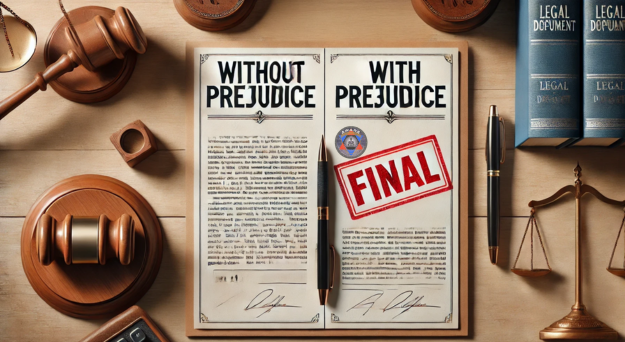Learn the key differences between ‘without prejudice’ and ‘with prejudice’ in legal terms. Discover how these phrases affect lawsuits, obligations, and your legal rights, and when a case can be reopened or is closed for good.
When walking the yellow brick road to common law, you’ll often come across terms like ‘without prejudice,’ ‘with prejudice,’ ‘without recourse,’ and ‘with recourse.’ Overstanding these terms is key to protecting yourself as you navigate legal and financial matters. What you don’t know can sometimes hurt you.
For starters, in law, never assume you know a word just because you’ve heard it before. Always look up the words. There are so many ways to say things in the English vocabulary, and these legal phrases are no exception. Though they may sound complex, they are just different ways of saying how final or risky a decision or transaction might be. So never assume you know a word, especially when dealing with court related matters and public officials alike.
Let’s get down into the definitions.
Without Prejudice vs. With Prejudice
- Without Prejudice: Think of this as hitting the “pause” button. If a case or claim is dismissed without prejudice, it means you can bring it back later. This means that a case or legal claim is dismissed or withdrawn, but the party is allowed to bring the same claim or case again in the future. It essentially leaves the door open for further legal action on the same matter. This often occurs in settlement negotiations or when a party wants to reserve the right to refile. Just because you didn’t win today doesn’t mean you can’t try again in the future. So getting your case “dismissed without prejudice” means that it can be opened up again in the future.
- With Prejudice: Now, this is like hitting “stop” for good. If something is dismissed with prejudice, you cannot bring it up again. This means that a case or legal claim is dismissed permanently, and the party cannot bring the same claim or case again in the future. Once dismissed “with prejudice,” the matter is considered fully resolved and closed. The case is closed, and you can’t come back with the same claim. It’s done.
In short:
- Without prejudice = can bring the case again later.
- With prejudice = cannot bring the case again; it’s final.
How about for lawsuits? What if my case got discharged with prejudice?
The same thing applies to lawsuits. Here’s a breakdown of this further.
Dismissed Without Prejudice” (for a lawsuit):
- Meaning: If a lawsuit is dismissed without prejudice, it means the court has ended the case for now, but the plaintiff (the person who filed the lawsuit) is allowed to bring the same case again in the future.
- Why this happens: This often occurs if there is a procedural issue (like missing paperwork or insufficient evidence at that time), but the plaintiff is allowed to fix the issue and refile the case later.
- Key takeaway: The case is temporarily closed, but the door is open for the plaintiff to try again.
Is “Discharged without prejudice” the same as “Dismissed without prejudice”?
- No. While they sound similar, they are not the same:
- Dismissed without prejudice means the lawsuit or case is temporarily closed, but the plaintiff can refile the case.
- Discharged without prejudice generally applies to obligations, such as debts, and means that the obligation may be canceled but could potentially be revisited (though this usage is less common).
Is “Dismissed with prejudice” the same as “Discharged with prejudice”?
- Yes, in the sense that both indicate finality:
- Dismissed with prejudice means the case is permanently closed and cannot be refiled.
- Discharged with prejudice means the obligation (like a debt) is permanently resolved, and no further claims can be made on it.
So while the terms dismissed and discharged refer to different things (legal cases vs. obligations), when used with prejudice, both mean the matter is final and cannot be reopened.
Which one do you prefer?








good explanation